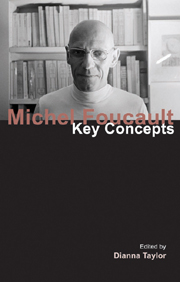10 - Subjectivity and truth
from PART III - SUBJECTIVITY
Summary
Is there a relationship between subjectivity and truth in our contemporary age? Foucault's answer is “no”. In this chapter, I seek to explicate Foucault's conclusion about the divorce of subjectivity and truth. Beginning with Foucault's account of the shift between ancient and modern philosophy, I show in the first section that the modern, strictly epistemological understanding of truth removes us from the possibility of having an ethical relationship to the truth. This ethical relationship to the truth, however, was the heart of ancient philosophy, whose goal was not “knowledge” but human flourishing. The second section explores the role of truth in ancient philosophy. The third section turns to an explication of Foucault's account of parrhēsia as it was understood in ancient philosophy. Parrhēsia is the act of telling the truth out of one's moral duty, even in dangerous situations. I then offer examples of how parrhēsia was used in ancient philosophy, followed by a brief discussion of whether or not we can recreate a meaningful relationship between subjectivity and truth.
In the shadow of the Cartesian moment
Foucault's 1982 lecture course The Hermeneutics of the Subject continues his investigation into the connection between subjectivity and truth begun in the 1981 course Subjectivity and Truth. In the 1981 lecture course, Foucault focused exclusively on Hellenic views of sexuality. In 1982, Foucault wants to ask the question of the relationship between subjectivity and truth in a more general way: “[i]n what historical form do the relations between the ‘subject’ and ‘truth,’ elements that do not usually fall within the historian's practice or analysis, take shape in the West?” (2005a: 2).
- Type
- Chapter
- Information
- Michel FoucaultKey Concepts, pp. 143 - 158Publisher: Acumen PublishingPrint publication year: 2010
- 1
- Cited by

